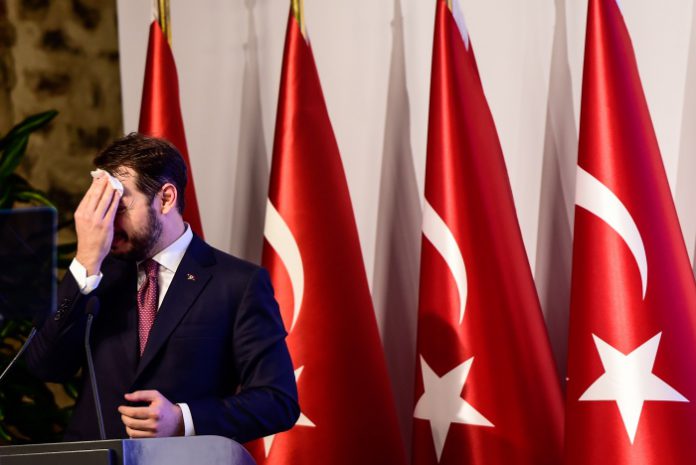Turkish Finance Minister Berat Albayrak offered little convincing detail of his economic turnaround plan and failed to enthuse investors at a private meeting in Washington on Thursday, according to sources who attended, Reuters reported.
Some 400 investors packed into a room at a Washington hotel, with dozens standing at the back, as Albayrak and Turkish Central Bank Governor Murat Çetinkaya outlined the reform package that Albayrak unveiled in İstanbul on Wednesday.
With the Turkish lira wobbling and investor confidence being eroded, committing to a convincing set of long-term reforms was seen as among Turkey’s best opportunities to revive an economy plagued by recession and high inflation.
But Albayrak’s upbeat view of Turkey’s expected rebound failed to resonate in Washington, said the sources, who requested anonymity. One told Reuters that Albayrak pointed to a recent dip in prices and the improving current account balance to argue that Turkey was doing much better today than in October, when it was emerging from a major currency crisis.
“I don’t think he persuaded anybody, it did not go well,” said the investor, who attended the conference hosted by investment bank JPMorgan as the International Monetary Fund and World Bank spring meetings kicked off in Washington.
The investor said recent pivots to more supportive policy stances by the US Federal Reserve and the European Central Bank, which have led investors to seek returns in riskier assets, was helping to underpin Turkish markets.
“If it weren’t the case that the Fed and ECB currently present no risk to emerging markets, I would be a big seller of Turkey,” the investor said.
The lira slid as much as 1.4 percent on Friday, among the worst performers in emerging markets, and the main Turkish stock index was down.
Turkey’s finance ministry could not be reached for comment on Thursday’s presentation, while the central bank declined to comment.
The recent lira volatility began with a sharp sell-off ahead of nationwide local elections on March 31 that handed shock losses in big cities to President Recep Tayyip Erdoğan’s ruling Justice and Development Party (AKP). It is contesting initial results in Istanbul.
The selling at times echoed last year’s full-blown currency crisis, which was sparked by strained US diplomatic ties and worries over central bank independence and a years-long buildup of foreign currency debt.
The lira tumbled some 30 percent in 2018, causing the economy to tip into a recession that economists expect will extend at least into the second half of this year.
